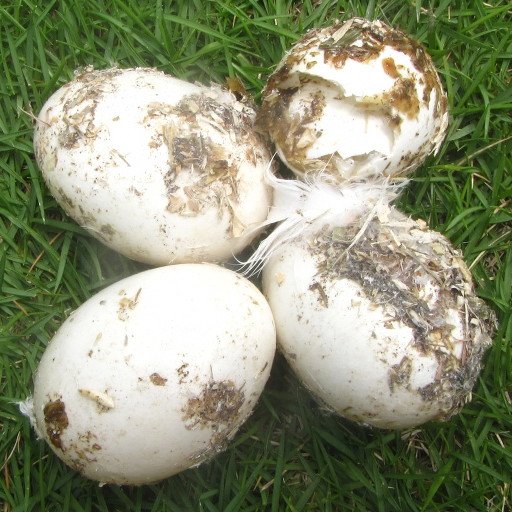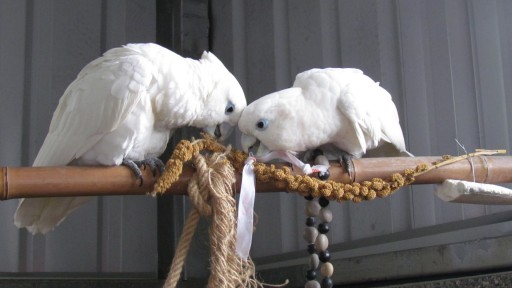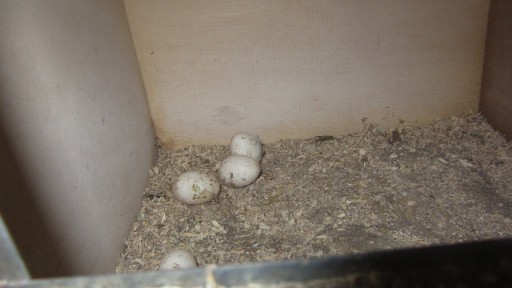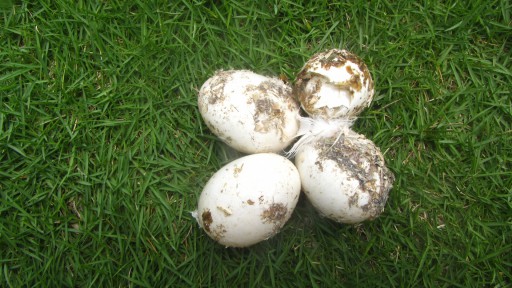I bought a pair of Solomons cockatoos (Cacatua ducorpsii) in December 2010. At six months of age, they were still babies and I continued to hand-feed them for several more weeks. By the time they were fully weaned, my aviary at the back of the house was finished and soon I was able to introduce the parrots into their new home. They seemed to settle in very well, enjoying the space that allowed them to fly short distances and the perches which let them investigate the surrounding farmland through several large windows. They also loved each other a lot, as was evidenced by the frequency of cuddles and head scratching they bestowed upon each other on a daily basis.
About two years ago, when the cockatoos were at the ripe age of three, I spotted their first attempt at mating. The process wasn’t easy to observe though; as soon as I arrived near the aviary and into their line of vision, they simply stopped and started paying attention to me instead – probably in the hope of getting a pistachio, their favourite treat. As such, I was forced to observe their lovemaking from a distance. After a few days of sneaking around the aviary, I was able to ascertain that Coco, the slightly larger and more dominant of the couple, was a male, while Alex, somewhat more shy and less brave, was the female.
I also rushed to a bird shop to buy a large box in case they wanted to set up a nest. As it turned out, this was premature – they completely ignored the new furniture for the next two years. Nevertheless, it was ready for use if it were ever needed. The time finally arrived in April this year when the two began investigating the potential nesting site sheepishly, going in an out through the rectangular side door and eventually staying inside for the night. I also started to hear the sounds of mating more frequently. So it was inevitable when, on 29 April, I discovered the first egg!
I was excited! “These lovely birds are going to have a family,” I thought, especially when the second egg was produced two days later. That was when the aviary became unusually quiet, with the two parrots taking their incubating duties extremely seriously. They always spent the night inside and only really came out of the box for taking food or doing a quick exercise. Everything went seemingly well and I was getting ready for the arrival of the newborn cockatoo chicks.
Alas, it did not happen. 26 days after the second egg had been laid, Alex abandoned the nest. Coco still spent most of his time inside the box, but he too gave up a couple of days later. As the birds no longer showed any interest in their eggs, I finally entered the aviary to take a look. To my great surprise, I saw four eggs in the nest! I left them there for a few more days (just in case), but eventually I took them out to investigate. One of them was broken with the content long gone, while the other three were all infertile – the liquid sound when shaken and the yolk clearly visible against the light told the sad story.
So what happened? Why were all the eggs infecund after so much mating between the two birds? Following a frantic few hours of searching on the Internet, I arrived at one possible explanation – Coco and Alex might both be female! Unlike with most other cockatoo species, it is impossible to determine the sex of Solomons cockatoos without a DNA test. So it’s quite conceivable that the two female birds, in the absence of any other possible partner, simply looked for a way to relieve their sexual urges, with subsequent egg-laying as a secondary effect of their hormonal activities. This would also explain the four eggs (a female of this species usually lays only two) and the fact that Coco continued his/her incubating duties longer than Alex (possibly because Coco’s eggs were laid later than Alex’s).
Or maybe my theory is all wrong and Coco’s and Alex’s second attempt at raising a family will be a resounding success. Who knows… Any comments from readers who have experience with breeding cockatoos?
(This page has been viewed 309 times.)






